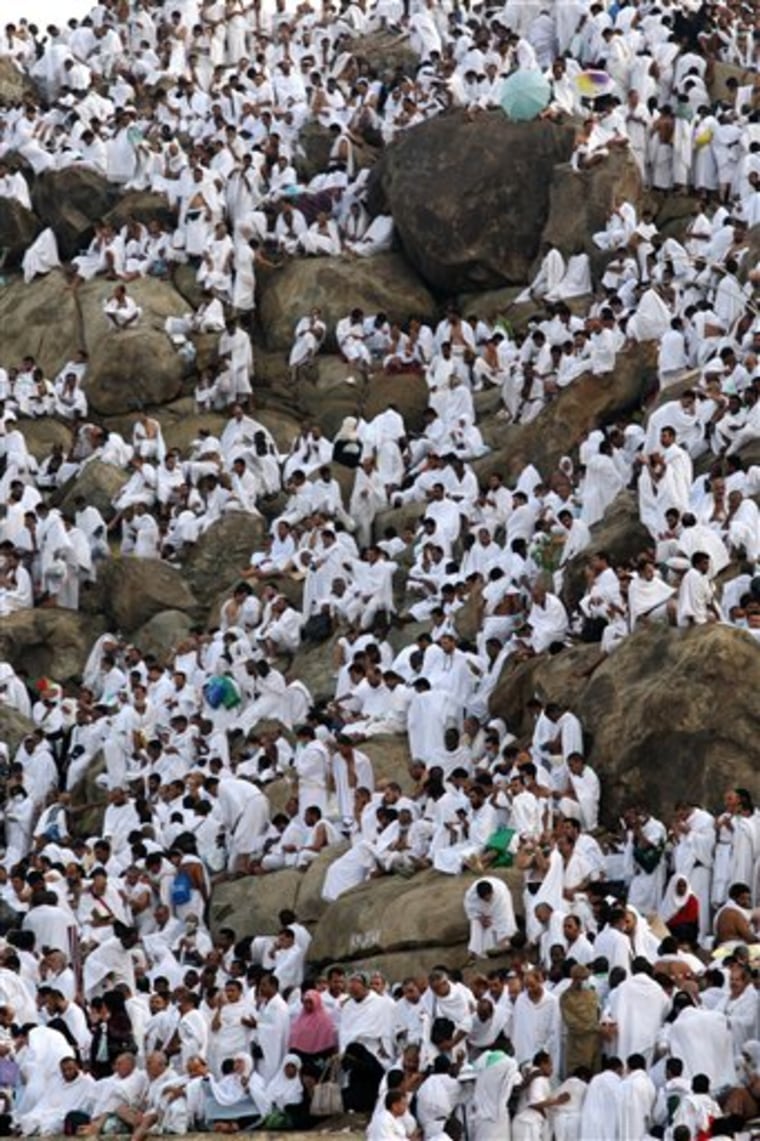Muslim pilgrims holding white umbrellas against the blazing sun clambered up a rocky desert hill for prayers Thursday during the annual hajj, a day after torrential rains that killed at least 77 people in Saudi Arabia.
Flooding from the unusually heavy downpours hit hardest in the Red Sea coastal city of Jiddah, about 40 miles away from the holy city of Mecca and its surrounding sacred sites where the 3 million Muslims from around the world were performing the rites of the pilgrimage.
Most of the deaths occurred in the shantytowns around Jiddah and along the main highway to Mecca, populated by poorer, foreign immigrants who work in the city as drivers, construction workers and domestic help. Streets were swamped with water, some houses collapsed and mudslides took place, civil defense officials said.
It did not immediately appear that any pilgrims were among the dead. Jiddah's civil defense chief, Capt. Abdullah al-Amri, said 21 of the victims were identified as Saudis and the rest were believed to be residents of Saudi Arabia.
Wednesday's downpours snarled the opening day of the hajj, drenching pilgrims and knocking out roads that caused epic traffic jams as the faithful tried to make their way to the holy sites. The rains, if they continue as meteorologists predict, could raise safety hazards — particularly the perennial danger of deadly stampedes, since a trip-up on slippery walkways could lead to people getting trampled in crowds.
'Not supposed to be easy'
But skies cleared for most of Thursday, and the heat rose. The umbrellas that protected pilgrims from the rain now were shades from the hot sun as they conducted their rituals in the desert plateau of Mount Arafat, about 12 miles east of Mecca.
The site is where Islam's Prophet Muhammad delivered his farewell sermon. The huge crowds of faithful climbed up the Mountain of Mercy, a rocky hill at Arafat, and prayed for God's forgiveness of their sins in what Muslims consider the spiritual high point of the pilgrimage.
Mohammed Ismail, a 51-year-old Syria who has lived the Saudi capital for the past 15 years, brought his wife and two young sons for the hajj, and Wednesday night they slept in their car at Arafat before performing the rites.
"You can't really describe the feeling of being at hajj and being so close to so many Muslims. It's so happy," he said, sitting on a straw mat by the roadside with his family, eating oranges. "The heat and the crowds can be difficult, but hajj is a difficulty, it's not supposed to be easy."
At the Mountain of Mercy, men in the white robes that males are required to wear and women in headscarves called out in prayer, and some prostrated at the foot of the mountain. In the tent city around the site, tired families took shelter in the shade of cars and buses or napped.
In the evening, the vast sea of people headed toward the next stage of the pilgrimage, the nearby plains of Muzdalifah. Tens of thousands of buses, SUVs, and cars jammed the road, while flocks of pilgrims walked across the barren landscape, carrying their belongings.
Stoning of the devil
At Muzdalifah, the faithful pick stones to use in the ritual that begins Friday, the symbolic stoning of the devil. At the nearby valley of Mina, they pelt stones at three walls representing Satan in a rejection of temptation.
The first day of stoning also marks the start of the Islamic holiday of Eid al-Adha, or feast of sacrifice, when Muslims around the world slaughter sheep and cattle in remembrance of Abraham's near-sacrifice of his son. The stoning lasts three days until the end of hajj on Sunday.
Saudi Arabia's biggest worry for months ahead of the hajj has been swine flu. The pilgrimage is one of the most crowded events in the world, with masses of Muslims from every corner of the globe packed shoulder to shoulder in prayers and rites — a perfect incubator for the virus, according to epidemiologists.
The Saudi government has been working with the United States' Centers for Disease Control and Prevention to set up clinics and take precautions to stem any outbreak.
The rains came as an added difficulty.
It often rains in Mecca and Jiddah during the winter months, but Wednesday's downpour was the heaviest in years during the hajj. Jiddah was swamped with 2.76 inches of rain, more than it would normally get in an entire year, according to Dale Mohler, senior meteorologist at the Web site AccuWeather.com.
